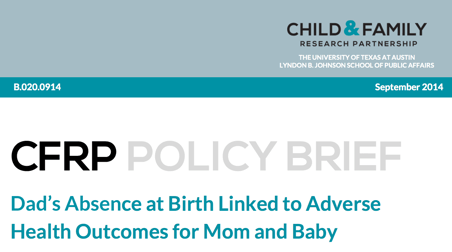Dad's Presence at Birth Leads to a Healthier Baby and Mom
2 min read
Date Published: 07/07/2016
Last Updated: 11/05/2020
National Fatherhood Initiative Blog / Latest Articles
2 min read
Dad's presence at the birth of his child increases the likelihood his child will be a healthy newborn. It also means mom is likely to be healthier.
 On the other hand, when dad is absent, baby and mom are less likely to be healthy. A research brief from the Child & Family Research Partnership at the University of Texas at Austin sums up their research on a large sample of unmarried moms in Texas in this way:
On the other hand, when dad is absent, baby and mom are less likely to be healthy. A research brief from the Child & Family Research Partnership at the University of Texas at Austin sums up their research on a large sample of unmarried moms in Texas in this way:
For unmarried parents there may be a connection between child health and fathers’ birth attendance after all—albeit a very different connection from the one feared in the past. Newly collected data show that a father’s absence at this key event, though not directly harmful, may nonetheless be a harbinger of early health complications for the newborn. These findings indicate that dad’s attendance is more than a mere gesture of support and commitment—it’s a window into the health and wellbeing of mother and child, and an opportunity for health policies that might anticipate and counteract adverse health outcomes for newborns.
Specifically, the children of absent dads are more likely to have a range of health complications and low birth weight. And moms are more likely to have had complications during pregnancy.
It's not surprising, then, that these absent dads are less likely to have been involved during the pregnancy. These absent dads are less likely to have:
Indeed, the differences in involvement between dads absent at birth and present at birth are astounding. Eighty-four percent (84%) of dads present at birth attended prenatal visits, for example, versus only 21 % of dads absent at birth.
The link between dads' involvement during the pregnancy and healthy outcomes for moms and babies isn't confined to the Lone Star State. National Fatherhood Initiative's Father Facts includes a number of studies on this link.
How can you and your organization use this knowledge and leverage NFI's resources? Here are just a few ways.
And don't forget one of NFI's newest, hottest resources: The Importance of an Involved Father brochure. There's not a faster, easier way to tell dads and moms about the need for dad's involvement.
What are you doing to engage dads and moms before and right after birth?
Do you provide resources and training for dads and moms to ensure they create the best environment in which to raise a newborn?
Are you a dad looking for help? Please visit our Fatherhood Program Locator™ and enter your city and state on the map to find programs and resources in your community.
Date Published: 07/07/2016
Last Updated: 11/05/2020
Download this free guide for a proven 7-step roadmap—from making the case and securing funding for your program, to launching and measuring real results!


Train Your Staff
Fatherhood Programs
Fatherhood Data
© 2026 National Fatherhood Initiative®. All rights reserved.